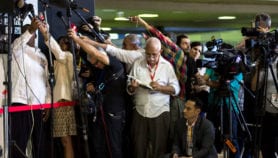By: Luisa Massarani
Send to a friend
The details you provide on this page will not be used to send unsolicited email, and will not be sold to a 3rd party. See privacy policy.
[RIO DE JANEIRO] Science is a major topic in Brazilian newspapers aimed at low-income social classes, along with football and crime, according to a new study.
Research released this week (26 March) analysed coverage in the newspapers Extra ― which has one of the biggest circulations on Sundays in Brazil at 428,000 copies ― and O Dia, which sells 238,000 copies on Sundays.
The research was conducted by science journalist Wagner Barbosa de Oliveira as part of his masters thesis at the Federal University of Rio de Janeiro.
He found that during a six-month period between 2005 and 2006, science stories appeared on 73.8 per cent of days analysed.
Furthermore, 86 per cent of these stories were published in highly visible areas, such as the top or middle of the page.
Journalists preferred to write about health issues, which represented 54.2 per cent of the total. Only three in ten stories were related to research in Brazil.
Oliveira praised their use of ‘reliable’ sources of information.
“A third of the stories explicitly mention universities and research centres as a source, and peer-review journals, even in English, are mentioned as sources in 13.9 per cent of the cases,” he told SciDev.Net.
However, Oliveira criticised the extent to which science stories were sensationalised, and also that science is presented as an established ‘truth’ — mirroring common practices in newspapers targeting more ‘elite’ audiences.
The study also shows that scientists do not write for newspapers aimed at the low-income classes. “This is a sign of the low importance given to popular newspapers by scientists ― which is a mistake in my opinion, since they are not considering that low-income classes are 80 per cent of the country’s population,” he said.
Oliveira, who works for the Oswaldo Cruz Foundation, believes that fostering an increased involvement of scientists in this sort of media could help deliver the message that science is an important issue for Brazil’s development.
Oliveira says his main reason for carrying out the study was the relevance of the mass media as one of the most important sources of information on science and technology for lay audiences in developing countries.
Often in developing countries, a significant amount of the population will have completed only part of formal education, or not have attended school at all.












